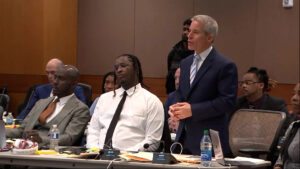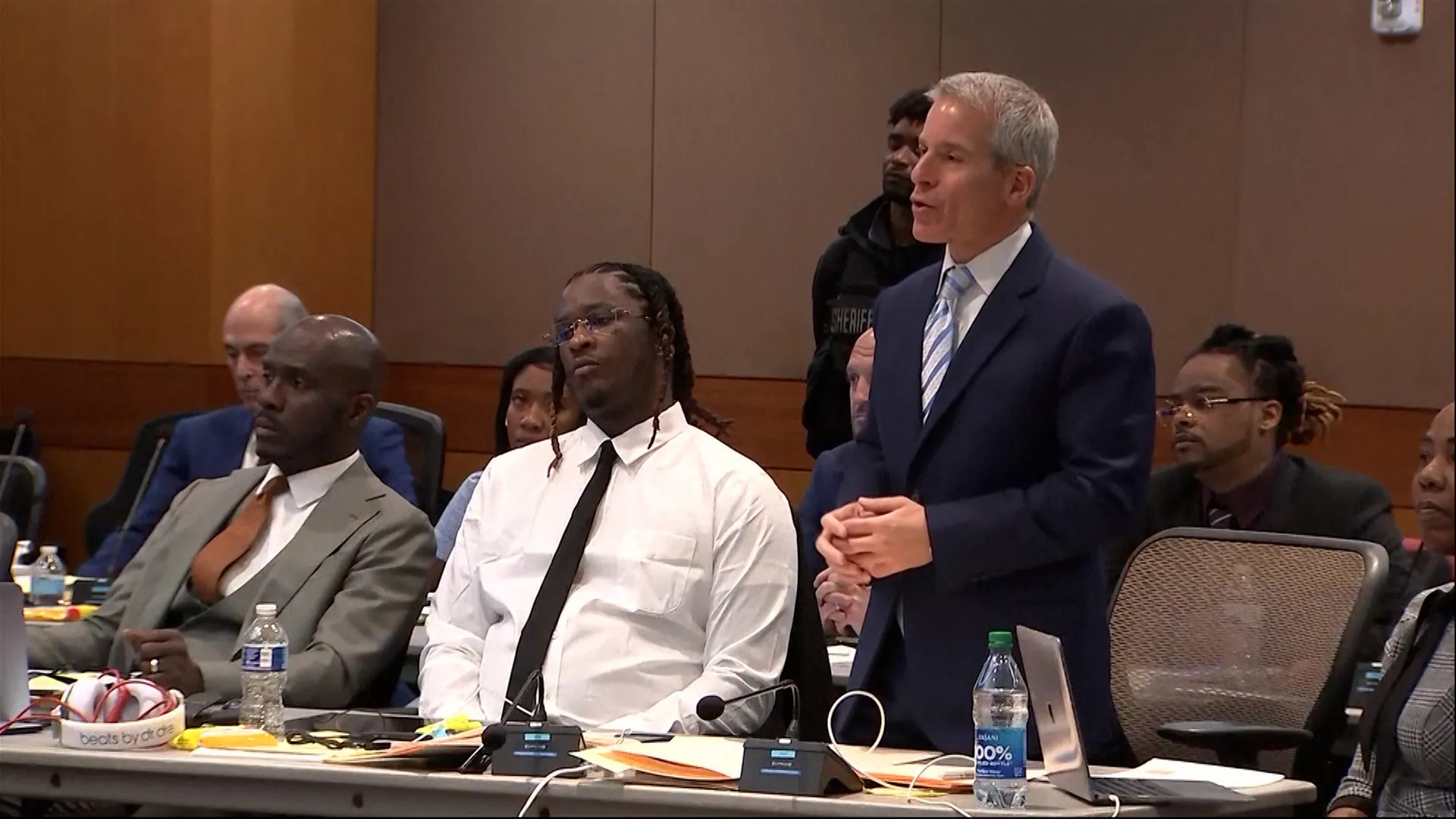In a high-stakes courtroom battle, the defense team for renowned rapper Young Thug is fervently contesting the prosecution’s portrayal of their client as the leader of a criminal street gang. In a recent development, Young Thug’s attorney, Brian Steel, delivered a passionate opening statement, asserting that the prosecution had misrepresented evidence and lyrics in the ongoing racketeering trial.
Steel vehemently rejected the idea that the Grammy-winning artist, whose real name is Jeffery Williams, would be involved in running a small-time street gang in Atlanta. He emphasized that Williams had achieved his success through sheer determination and hard work, without any need for criminal activities. “He’s not sitting there telling people to kill people,” Steel added, emphasizing that Williams was already worth tens of millions of dollars.
This high-profile trial is set to be a significant test of the state’s Racketeer Influenced and Corrupt Organizations Act (RICO), a law previously used to indict former President Donald Trump and 18 co-defendants in connection with alleged attempts to overturn the 2020 election. The case also raises questions about the controversial use of rap lyrics as evidence.
Young Thug, at the age of 32, is known as one of the most innovative and influential artists in the music industry. His unique style has pushed both musical and cultural boundaries. He gained recognition for his decision to wear a purple dress on the cover of his 2016 album, “Jeffery,” and his collaborations with leading artists such as Travis Scott, Drake, and Camila Cabello. Furthermore, he won the Grammy for “Song of the Year” in 2019 for co-writing “This is America” with Childish Gambino and Ludwig Göransson.
The legal saga began last May when Young Thug and over two dozen others were charged under the state’s RICO act, accused of heading a criminal street gang. Some of the co-defendants accepted plea deals, while others had their cases separated from this trial. In addition to the RICO charges, Young Thug also faces drug and gun-related charges stemming from a search of his home. He has been in custody since his arrest last year but managed to release his latest album, “Business is Business,” from jail over the summer.
Prosecutors, in their opening statements, asserted that Young Thug’s record label, Young Stoner Life Records (YSL), was, in fact, an Atlanta-based criminal street gang involved in armed robbery, hijacking, motor-vehicle theft, possession of a machine gun, and murder. According to Fulton County Chief Deputy District Attorney Adriane Love, the gang members all answered to Young Thug, whom she referred to as the “proclaimed leader” of the group.
The defense countered these claims by presenting Young Thug’s life story. Steel portrayed the rapper as someone who had grown up in poverty in Atlanta, sharing clothes with his ten siblings to give the appearance of affluence. Young Thug’s dedication and work ethic, he argued, were solely focused on achieving success as a rapper and helping uplift his community.
Steel also shed light on the origin of Young Thug’s stage name, explaining that it was inspired by the Tupac song “PYT (Playa Young Thugs)” and stood for “Truly Humble Under God.” He further noted that the rapper’s record label, Young Stoner Life, was a nod to the fashion line Yves Saint Laurent, known for its YSL acronym.
The defense attorney meticulously dismantled each of the “overt acts” listed in the indictment, claiming there was no substantial evidence to support Young Thug’s involvement in the alleged crimes. He argued that prosecutors and law enforcement had unfairly targeted his client, turning his neighborhood charity efforts into a conspiracy. For example, prosecutors alleged that Young Thug had rented a car used by YSL members in a murder, but Steel contended that the rapper had frequently rented cars for various people, without control over their subsequent use.
“He’s not the crater. He’s trying to pull people out of poverty,” Steel emphatically stated.
In a recurring theme throughout the trial, prosecutors referenced Young Thug’s own songs, highlighting lyrics that they claimed bore eerie significance to real-life crimes. However, Steel insisted that these lyrics were a form of art and not confessions of guilt. “He’s not the head of a conspiracy. He’s not in a conspiracy. They are lyrics,” he asserted.
The trial also involves five other defendants: Marquavius Huey, Deamonte Kendrick, Quamarvious Nichols, Rodalius Ryan, and Shannon Stillwell. Their defense attorneys echoed Steel’s sentiments, criticizing the prosecution’s approach to the trial, which is expected to last for several months and feature numerous witnesses.
As this high-stakes legal battle unfolds, it remains to be seen whether the prosecution can prove its case against Young Thug and his co-defendants. The defense contends that their clients are innocent and that the use of rap lyrics as evidence infringes upon their freedom of speech and association.
The coming weeks promise intense courtroom drama as both sides present their arguments and witnesses. The outcome of this trial will undoubtedly have significant implications for not only Young Thug but also the use of RICO laws and rap lyrics as evidence in future legal proceedings.
The racketeering trial of Young Thug has kicked off with a fervent defense challenging the prosecution’s portrayal of the rapper as the leader of a criminal street gang. With the defense arguing that Young Thug is not involved in criminal activities and that his success is a result of hard work and determination, this trial will test the boundaries of the RICO law and the use of rap lyrics as evidence. As the trial unfolds, the legal world watches closely to see whether the prosecution can substantiate its claims or if the defense’s assertions will hold. The outcome of this case may have far-reaching implications for the future of such trials and the use of artistic expression in legal proceedings.





















+ There are no comments
Add yours